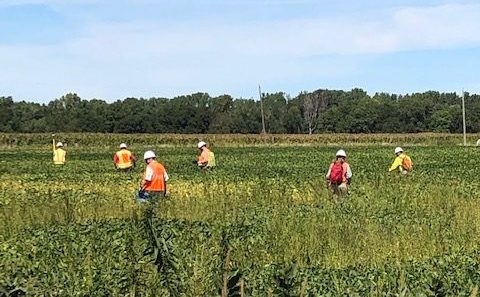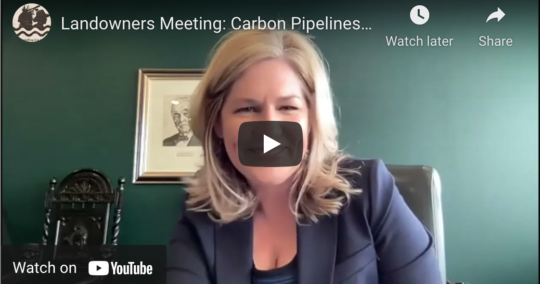

FOR IMMEDIATE RELEASE: Sept. 24, 2020
TransCanada Keystone XL Pipeline Surveys Concern Tribes, Disrupt Nebraska Farmers’ Harvests
Ponca Tribe of Nebraska urges State Dept. to inform TC Energy its current “surveys” for Native American cultural artifacts and sites are invalid, do not meet federal obligations
Norfolk, NE — The Ponca Tribe of Nebraska has written to the U.S. Department of State, urging the U.S. government to inform TransCanada / TC Energy that the current claimed “surveys” that the company’s contractors are conducting during harvest on landowners’ farms are insufficient, do not meet basic standards for such surveys, and in no manner fulfill the government’s obligations to the Tribe, Nebraska, or the public at large under federal law or promised under the “Programmatic Agreement” for the proposed Keystone XL pipeline.
When seeking approval for its pipeline from the Nebraska Public Service Commission (PSC), TransCanada promised the Programmatic Agreement would ensure all historic and cultural resource surveys would be completed and all historic and cultural resources fully protected. Despite the Ponca Tribe pointing out that it was not allowed to be an actual party to the Programmatic Agreement, had no way to enforce its compliance, and did not believe the Programmatic Agreement would be followed or actually protect historic and cultural resources given its weak provisions, the PSC believed TransCanada and relied upon its representation, including that full surveys in Nebraska would be completed, when it approved the pipeline. The Department of State also relied on the Programmatic Agreement requiring full surveys in its Final SEIS issued last year allowing the pipeline to move forward, again dismissing the Tribe’s concerns that it would not be followed and that full surveys should be completed before giving TransCanada permission to build its dangerous pipeline.
The Ponca Tribe first learned about these impending “surveys,” to take place from late August through September, from landowners opposed to the Keystone XL in Madison, Holt, and other Nebraska counties who are currently challenging the eminent domain condemnations by TransCanada to take their land for the pipeline. Apparently, the “surveys” are intended to encompass all environmental, historic, and cultural investigations and surveys at once in a single day.
The Tribe initially contacted the State Dept. objecting to the lack of notification and tribal participation in the “surveys,” including raising concerns that they may not be sufficient to meet the United States’ obligations and promises under federal law and the Programmatic Agreement. The Tribe specifically raised a concern that the surveys would only cover the 110-foot construction right-of-way TransCanda is taking from landowners through condemnation and not encompass the full 300-foot wide area required by the Programmatic Agreement, the area which is expected to be impacted by the pipeline and called the Area of Potential Effect (APE) by the State Dept.
The Tribe was surprised to learn, in the U.S. State Dept.’s response via contractor SRI Foundation, that the State Dept. had no prior knowledge of the surveys TransCanada was conducting. However, while confirming that surveys would indeed only cover the 110-foot right-of-way and not the full 300-foot wide area required by the Programmatic Agreement and would purport to cover every aspect of environmental, historic, and cultural resource investigation at the same time in one day, the State Dept. expressed no concern that the proposed process would in no manner fulfill the United States’ obligations under federal law or its promises to the Tribe or even Nebraska under the pipeline’s Programmatic Agreement, even though Nebraska’s State Historic Preservation Office is actually a party.
The Ponca Tribe has grave concerns about the lack of any proper consultation or participation of Tribal personnel in these “inspections.” Personnel from the Tribe’s Culture Department, including its Tribal Historic Preservation Officers (THPO), visually observed the first of these “inspections” and were dismayed they did not conform to any professional guidelines. According to persons who have witnessed TransCanada’s activities, its contractors appear to merely be walking the centerline of the right-of-way through waist-high crops and calling it a full environmental investigation, including cultural and historic resource surveys. It does not appear that any shovel tests are being conducted to see what may be below the surface and no samples even being collected. The Ponca Tribe fears that its concerns expressed to the State Dept. and the Nebraska PSC that the Programmatic Agreement was insufficient and would not be followed are being confirmed, opening the door to the destruction of historic and cultural resources as well as religious sites as has been seen with other pipelines.
In response to the Tribe’s initial contact with the State Dept. about the surveys and the lack of notice or participation by personnel or experts from any tribe, the State Dept. said the Tribe could identify parcels of land to “inspect,” not even suggesting that full Tribal Cultural Properties (TCP) surveys would be considered. In response, the Tribe informed the State Dept. the Tribe would not allow some limited Tribal presence to be used to legitimize clearly inadequate surveys that in no manner will protect historical and cultural resources or the environmental and public health interests of the Tribe or Nebraskans at large.
“Given the lack of inclusion of the entire APE (Area of Potential Effect) and the methodology with which these surveys are apparently being conducted, it is clear that DOS and TC Energy are in no manner taking these cultural resource surveys seriously, and, in turn, cannot expect the Tribe to assist in these “surveys” to give them some semblance of legitimacy. DOS and TC Energy must conduct true and thorough cultural resource surveys, including TCP surveys, with full tribal involvement, of the entire APE in a manner that is consistent with professional standards. Anything less shows a blatant disregard for any tribal resources and sacred sites. The Tribe demands that DOS publicly and formally inform TC Energy that these so-called “surveys” will not be deemed to meet the obligations, commitments or requirements of the Programmatic Agreement or any applicable law related to cultural and historic resources.”
—Chairman Larry Wright, Jr., Ponca Tribe of Nebraska
Nebraska landowners are also upset that TC Energy wants to disrupt their farming operations during harvest by bringing a team of over a dozen contractors onto their land for these inspections. Furthermore, landowners were alarmed that any survey would be considered accurate or valid when visual inspection of anything on the ground is essentially impossible through waist-high soybeans.
The Nebraska Easement Action Team (NEAT) and Bold Nebraska urge TC Energy to halt these worthless disruptions and call for the U.S. government to fully consult properly with the Ponca Tribe of Nebraska and all affected Tribal Nations.
“TC Energy, and our own government under Trump, are failing to honor the basic fundamentals of even conducting a survey of land and cultural resources in an honest way. If they can not conduct a survey correctly, how are we supposed to trust them to protect the land and water with their risky pipeline?” said Jane Kleeb, Bold Nebraska founder. “Bold stands firmly with farmers and ranchers’ property rights, and Tribal Nations’ sovereign and treaty rights—the people of Nebraska agree with us, and the politicians like Gov. Ricketts who continue to give TC Energy political cover should be ashamed of themselves.”
View photos of “inspections,” correspondence between Ponca Tribe and U.S. State Dept:
https://boldnebraska.org/transcanada-keystone-xl-surveys-concern-tribes-disrupt-nebraska-farmers-harvests/
# # #



